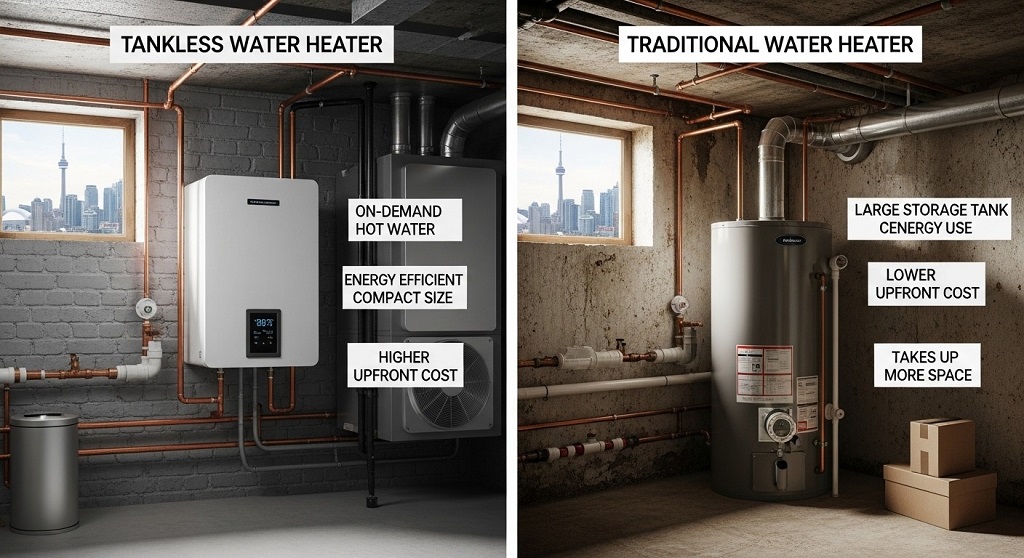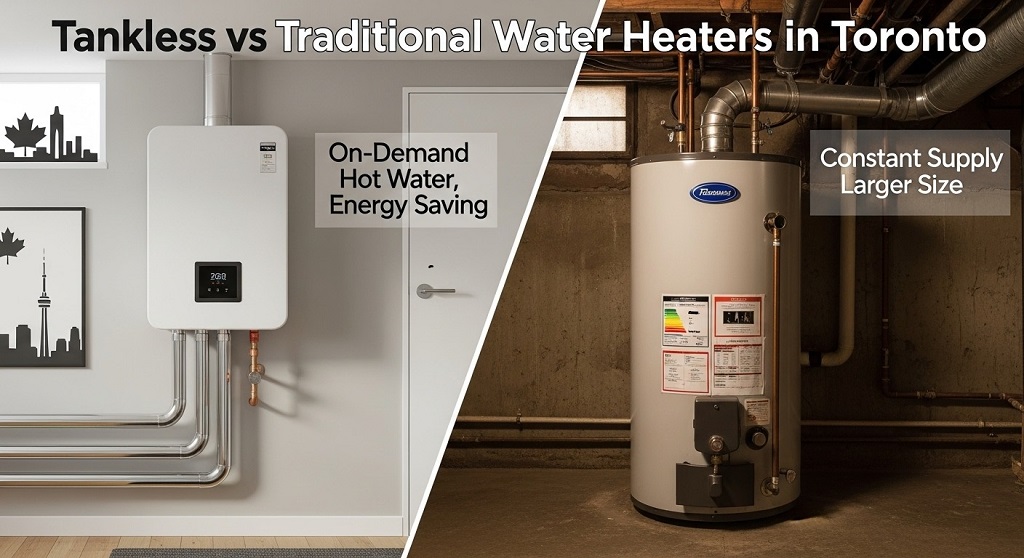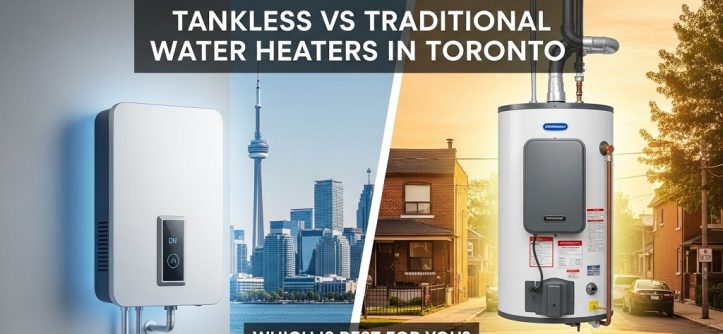Toronto homeowners face a big decision when replacing their water heater. Cold winters demand reliable hot water, yet rising energy bills push many toward more efficient options. In fact, water heating accounts for about 19–25% of the average Ontario household’s energy use, according to Natural Resources Canada. Meanwhile, the City of Toronto’s TransformTO climate plan encourages lower-carbon choices. So, should you stick with a conventional storage tank model or switch to an on-demand tankless system? This guide compares both technologies side-by-side with Toronto-specific insights to help you decide.
Understanding Traditional Tank Water Heaters
Traditional water heaters, also called storage tank models, remain the most common choice across the Greater Toronto Area. These units hold 40 to 80 gallons of hot water in an insulated tank, ready whenever you turn on a tap.
Manufacturers build them with either electric elements or gas burners. Electric models dominate condo and high-rise installations because natural gas lines often aren’t available. Gas-fired versions appear more frequently in single-family homes and townhouses.
Homeowners appreciate the familiar technology. Plumbers know these systems well, and replacement parts stay readily available throughout the GTA. Most units operate quietly and deliver strong water pressure even when multiple taps run simultaneously.
However, standby heat loss occurs 24/7. The tank continuously reheats cooled water, even when nobody uses it. This constant cycling explains why traditional units consume more energy over time.

How Tankless Water Heaters Work
Tankless water heaters, often called on-demand or instantaneous units, heat water only when you need it. Cold water travels through a heat exchanger activated by flow. Within seconds, hot water reaches your shower or faucet.
Modern condensing tankless models achieve efficiency ratings above 95%. Non-condensing versions still reach 80–85%. Both far outperform the 60–70% typical of storage tanks.
Because they lack a tank, wall-mounted tankless units occupy roughly the size of a carry-on suitcase. Homeowners in tight Rosedale basements or downtown condos especially value this compact footprint.
Moreover, tankless systems deliver endless hot water. Families in North York or Scarborough with teenagers who take long showers never run out again.
Energy Efficiency Comparison in Toronto’s Climate
Toronto experiences long, cold winters. Outdoor temperatures regularly drop below –15°C. These conditions directly affect water heater performance.
Traditional tanks lose heat faster during extreme cold. Insulation helps, but standby losses increase when incoming water arrives near freezing.
Conversely, tankless units adjust output automatically. Advanced models modulate the flame or electric elements based on incoming water temperature and flow rate. Many Toronto installers pair gas tankless heaters with outdoor reset sensors for optimal winter performance.
Natural Resources Canada reports that switching to a high-efficiency tankless heater can reduce water-heating energy use by 30–50% in Canadian homes. For an average Toronto household, this translates into meaningful yearly savings.
Installation Considerations for Toronto Homes
Space constraints challenge many Toronto properties. Century homes in The Annex feature narrow basement staircases. New condos in Liberty Village offer limited mechanical closets.
Tankless systems shine here. Technicians mount them on walls and vent horizontally through an exterior wall using concentric venting kits approved by the Technical Standards and Safety Authority (TSSA).
Traditional tanks require floor space plus clearance around all sides. Moving a 50-gallon unit into an older home sometimes demands temporary wall removal.
Gas line upgrades often accompany tankless installations. Most existing ½-inch lines can’t supply enough gas for whole-home units. Homeowners typically need a ¾-inch line from the meter, which Toronto plumbers complete regularly.
Electrical tankless models avoid gas upgrades entirely. Yet whole-home electric tankless heaters demand 100–150 amps of available capacity—rare in older Toronto homes without service upgrades.
Hot Water Delivery and Household Size
Family size heavily influences the right choice.
A household of two in a downtown condo rarely taxes a 40-gallon tank. These residents enjoy lower upfront disruption by staying traditional.
Larger families in Etobicoke or Markham tell a different story. Simultaneous showers, dishwasher cycles, and laundry easily deplete a standard tank. Parents often hear the dreaded “You used all the hot water!”
Tankless sizing uses gallons-per-minute (GPM) ratings. Toronto plumbers calculate winter groundwater temperature around 4–6°C when recommending units. A family of five typically needs a 9–11 GPM gas tankless heater to run three showers plus a sink comfortably.

Maintenance and Longevity Differences
Storage tanks generally last 10–15 years in Southern Ontario’s water conditions. Sediment buildup from Lake Ontario water shortens lifespan unless homeowners flush annually.
Tankless units often reach 20+ years with proper care. Most manufacturers recommend descaling every 12–24 months in hard-water areas like Toronto. Professional maintenance costs remain modest compared to premature tank replacement.
Furthermore, many tankless models feature self-diagnostic codes and removable parts. Technicians in the GTA stock common components, minimizing downtime.
Environmental Impact in the Toronto Context
Toronto aims for net-zero community-wide emissions by 2040. Water heating represents a major opportunity.
Electric tankless heaters paired with Ontario’s increasingly green grid offer near-zero operational emissions. Heat-pump hybrid water heaters take this further, though availability remains limited.
Gas tankless units still burn fossil fuels. However, condensing technology extracts nearly all available heat, cutting CO₂ emissions 30–40% versus conventional gas tanks.
Many environmentally conscious homeowners in Roncesvalles and Leaside now choose tankless for both efficiency and reduced carbon footprint.
Performance During Toronto Winter Power Outages
Ice storms occasionally knock out electricity across the city. Traditional electric tanks retain hot water for hours after power fails.
Electric tankless units stop completely without electricity. Gas-powered tankless models with electronic ignition also require power for controls and pumps.
Only specific non-electric ignition gas tankless units operate during blackouts—a rare feature most Toronto homes lack. Homeowners who prioritize outage performance often keep traditional tanks or add generator transfer switches.
Water Quality and Toronto’s Hard Water
Toronto’s water hardness averages 120–130 mg/L. Scale buildup affects both tank and tankless performance.
Traditional tanks accumulate sediment at the bottom. Annual flushing helps, but elements and anode rods still corrode faster.
Tankless heat exchangers suffer more dramatically from scale. Manufacturers strongly recommend water softeners or scale-prevention systems for longevity in the GTA. Many Toronto plumbing companies now bundle these solutions.
Making Your Decision: Key Questions to Ask
Consider these factors specific to your Toronto home:
- How many people live in your household?
- Do you experience morning hot-water shortages now?
- How much mechanical room or closet space do you have?
- Do you plan to stay in this home 10+ years?
- Does your electrical panel have spare capacity?
- Are you prioritizing lower energy bills or initial simplicity?
- Do you value environmental impact highly?
Answering honestly points most families toward the clearer choice.
Real Toronto Homeowner Experiences
Sarah from Leslieville replaced her leaking 50-gallon tank with a Rinnai tankless unit in 2023. Her family of four now enjoys simultaneous showers and never worries about the last person getting cold water.
Mike in Scarborough kept his traditional electric tank when downsizing to a condo. The building’s mechanical regulations and limited amperage made tankless impractical.
Both homeowners made decisions that fit their unique circumstances.
Related Topics: Water-Wise Gardening Tips Every Canadian
Conclusion
Neither tankless nor traditional water heaters claim universal victory. Toronto’s cold climate, older housing stock, hard water, and sustainability goals create nuanced trade-offs.
Tankless systems deliver superior efficiency, endless hot water, and space savings—ideal for growing families and eco-conscious homeowners willing to invest in proper installation and maintenance.
Traditional storage tanks offer simplicity, lower disruption, and proven reliability—perfect for smaller households or buildings with infrastructure constraints.
Assess your household size, hot water patterns, space, and long-term plans. Then consult a TSSA-licensed Toronto plumber for a professional load calculation and recommendation tailored to your home.
Take the first step today—schedule an in-home assessment and discover which water heater truly suits your Toronto lifestyle.
Related Topics: Traditional English Gardens Are Back
FAQs
Which water heater is more energy efficient in Toronto winters?
Tankless models typically save 30–50% on energy compared to storage tanks, even during Toronto’s coldest months, because they eliminate standby heat loss.
Can I install a tankless water heater in my older Toronto home?
Yes, in most cases. However, you may need gas line or electrical upgrades. A qualified plumber evaluates feasibility during the site visit.
Will a tankless water heater work during Toronto power outages?
Only specific gas models with battery backup or pilot ignition continue operating without electricity. Most modern units require power for controls.
How often should Toronto homeowners descale a tankless water heater?
In Toronto’s moderately hard water, professionals recommend descaling every 12–24 months, or installing a scale-prevention system at setup.
Do tankless water heaters provide enough hot water for large Toronto families?
Absolutely. Properly sized units (9–11 GPM) handle three simultaneous showers plus additional fixtures with ease.
References
- Natural Resources Canada – Water Heater Guide: https://natural-resources.canada.ca/energy-efficiency/energy-star/water-heaters
- City of Toronto TransformTO Net Zero Strategy: https://www.toronto.ca/services-payments/water-environment/environmentally-friendly-city-initiatives/transformto/
- Technical Standards and Safety Authority (TSSA) – Fuel Safety Regulations: https://www.tssa.org/regulations/fuels





Leave a Reply